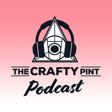
Thirty Years Of Pioneering Beers
“We’re lucky to work in an industry that’s a lot about fun.”
This week’s guests need little, if any, introduction. Not only is BentSpoke – the brewery launched in a Braddon brewpub in 2014 and now a national brand – one of the country’s best-loved operations, but its founders have connections with Canberra’s beer scene stretching back three decades.
Richard Watkins and Tracy Margrain met while working in the kitchen at the Wig & Pen, a tiny Canberra brewpub that became a hotbed for experimentation and innovation. Once he’d swapped the stovetop for the mash tun, Richard started hunting down new ingredients and styles, while playing with barrels and funk long before the craft beer was even called “craft”, picking up major awards and influencing many that passed through its doors.
Since launching BentSpoke together, alongside the Meddings family who run Bintani, the couple have continued to innovate, helped bring IPA to a wider audience – their unexpected best-seller Crankshaft has topped the GABS Hottest 100 poll twice, and kept winning major awards, all the while adding their voice to discussions around the direction of the local beer industry.
As well as reflecting on an incredible three decades in beer, their affinity for the homebrewing world, the state of play for beer today, and future plans for the brewery, arguably the key takeaway from our chat is their ongoing, deep-rooted affection for beer and the community that surrounds it.
Prior to the main interview, Will and James discuss some exciting breaking news from Sydney, where a trio of brewing companies under the banner Misfits have taken over Wayward’s Camperdown taproom and are opening today.
Also in Sydney, we invited Bracket Brewing to reflect on their first five years via five key beers, while there was further positive news as the men’s mental health-supporting Convo Crates have been given new life via Nick’s Jerky, and Urban Alley announced plans to open a far bigger venue at Chadstone Shopping Centre.
We also highlight a trio of upcoming events for our beer club members in Freo, Brisbane and Melbourne, and, of course, issue a reminder to get in your nominations for the Bluestone Yeast Brewery of the Month and Have You Done A Rallings? campaigns.
Start of segments:
- 13:04 – BentSpoke Part 1
- 36:07 – Breaking Down Beer Styles with Mogwai Labs
- 42:47 – BentSpoke Part 2
To find out more about featuring on The Crafty Pint Podcast or otherwise partnering with The Crafty Pint, contact craig@craftypint.com.
